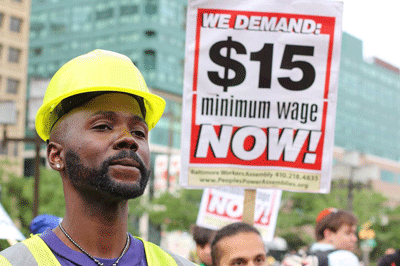State legislators in Annapolis are expected to vote on a proposal to gradually increase Maryland’s state-wide minimum wage to $15 per hour by 2023 on Thursday, February 21, 2019. The bill has 77 co-sponsors, and comes after years of campaigning by community activists and labor groups.
Twenty of the 22 state legislators representing Baltimore City are either co-sponsoring the bill or expressed support of it to The Baltimore Times. The other two, Dalya Attar (D-41) and William Ferguson (D-46) did not respond to requests for comment.
Founded in 2012 by fast food workers in New York, the Fight for 15 campaign has been active in supporting such wage raises across the country. Ricarra Jones, an organizer for Maryland’s Fight For 15 group, says a bill like this one is long overdue.
“We’ve spent a lot of time on the ground talking to residents about the need to raise wages, and how when we raise wages it has positive effects on the community,” Jones told The Baltimore Times. “We have a lot of residents expressing the concern, or the need, that the bill should be implemented faster.”
The bill would also remove the lower legal wage for tipped employees by 2027. Jones says this change would mark a victory for some of Maryland’s most vulnerable workers.
“Most tipped workers, especially in Baltimore, are women and they’re women of color,” Jones explained. “They also have some of the highest rates of poverty, of having to receive public assistance, and some of the highest rates of sexual harassment. So this issue is very, very important to us, and we absolutely want to see these workers receive a full minimum wage.”
Jones added that the Fight for 15 campaign has received the most resistance in Baltimore from the Chamber of Commerce. The Baltimore City chamber did not respond to requests for comment, but Jones stated that some business owners she has spoken with were not consulted about their opinions on the bill.
Columbia business owner Brian England supports the minimum wage increase, and describes feeling frustrated when his local and statewide Chambers of Commerce take strong stances without consulting business owners.
“I was on the legislative committee of the [Howard County] Chamber of Commerce about a decade ago, and… it’s not very democratic,” England told The Baltimore Times. “What happens is, the board will decide on a position and send it down to the legislative committee to be approved.”
In England’s experience, many small businesses adopt the Chamber’s position on important issues because they lack the time and resources to do their own research. The Chamber itself, however, is often reluctant to reveal the reasoning behind its decisions.
“One of the frustrations I’ve had is I’ve never been able to get data from people,” England said of the bill’s opponents.
When another local businessman told him a minimum wage increase would “cost a fortune,” England calculated how a $1 per hour wage increase would affect the man’s restaurant franchise. He found that food prices would need to
increase by only 1.6 percent to give fifteen restaurant employees each an extra $2,000 per year under such a change.
“That money goes back into the local economy,” England said. “Raising the minimum wage up to fifteen dollars over a period of time is the right thing to do
because it’s going to take pressure off the social safety net, and it’s right that people should earn enough money to live. They shouldn’t have to rely on food banks and [other public services] to get by.”
A fifteen dollar minimum wage is not a brand-new proposal in Baltimore City. In 2017 the City Council voted in favor of a gradual increase in the city’s minimum wage to $15 per hour, but the measure was vetoed by Mayor Catherine Pugh.
Former state Delegate Donald C. Fry supported Pugh’s veto, arguing that wage increases at the city level would have negative economic impacts. Fry is now the president of the Greater Baltimore Committee (GBC), a group of local businesses and civic organizations.
The GBC expressed support for the current bill on the condition that it adopts a number of amendments, including eliminating provisions that raise tipped wages and protect seasonal and youth workers. It also expressed desire for an extended timeline for some businesses to implement the new wage.
“Small and mid-size employers need additional time to plan and adjust to ensure their financial stability and future growth. Otherwise, they may face hardship,” said Fry in a press release.
Jones, however, emphasized that citizens should put pressure on their representatives to vote for a “clean fifteen”– a bill with no such amendments to the new wage law.
“[We need] a bill that covers the most people,” Jones concluded, “meaning that there’s no carve-outs, no exceptions, and we’re not leaving big groups of workers behind.”
